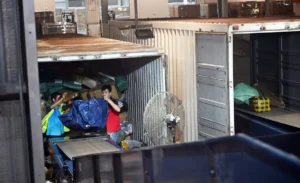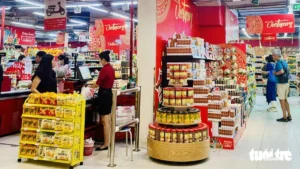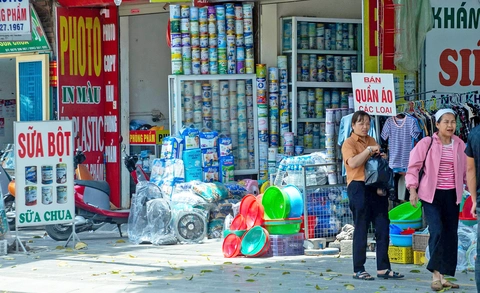Strengthen mandatory post-inspection instead of only inspecting when there is a complaint; supplement regulations on joint responsibility of social networking platforms and e-commerce platforms
Alarm bell
In recent days, fake milk has become a hot topic, attracting special attention in society after the Ministry of Public Security informed about the case of producing and trading fake milk at Rance Pharma International Pharmaceutical Joint Stock Company and Hacofood Group Nutrition Pharmaceutical Joint Stock Company. Notably, the authorities determined that the line run by the defendants produced 573 brands of powdered milk of various types, for people with diabetes, kidney failure, premature babies and pregnant women with a profit of nearly 500 billion VND.
After the incident was exposed, consumers nationwide were shocked, worried and angry at the problem of fake food that is becoming increasingly painful in society. This is truly like a bomb dropped directly on the milk market as well as having a great impact on consumer psychology.
There are still many shortcomings in the legal loopholes, analysts pointed out: Decree 15/2018/ND-CP detailing the implementation of a number of articles of the Food Safety Law shows that functional foods are regulated to include 4 groups: supplementary foods, health protection foods, medical nutritional foods, foods for special diets; in which, the group of supplementary foods can be self-declared.
This policy is considered a positive reform step, aiming to reduce administrative procedures and create conditions for businesses to operate more flexibly and proactively in production and business. However, many cases have taken advantage of this to produce and trade poor quality products, labeled as “premium powdered milk” or “nutritional products” and then advertised and deceived consumers.
Mr. Tran Huu Linh, Director of the Department of Domestic Market Management and Development (Ministry of Industry and Trade) stated that according to Decree 15/2018/ND-CP, the Ministry of Industry and Trade is responsible for managing the group of regular processed milk products. Milk products supplemented with micronutrients, functional foods or pharmaceuticals with special nutritional ingredients are under the management authority of the Ministry of Health.
It is worth mentioning that the Ministry of Industry and Trade does not have the authority to grant business registration licenses to enterprises, but this responsibility belongs to the Department of Planning and Investment of provinces and cities. Thus, it can be seen that part of the responsibility related to granting initial operating licenses is outside the direct scope of the Ministry of Industry and Trade.
In fact, in recent years, authorities have handled hundreds of cases of production and trade of counterfeit milk. In the 4 years from 2021 to 2024 alone, market management forces nationwide inspected and handled 783 cases; the fine amount was more than 2.2 billion VND; the number of violating goods was 58,187 boxes, 451 crates, 20,394 bottles/cans.
“Typically, Hanoi has inspected and punished 53 cases with a total fine of 546 million VND; the total amount of confiscated and destroyed goods for milk products is 5,853 cans, boxes, bottles… with a total value of more than 200 million VND”, Mr. Tran Huu Linh informed.
Regarding the information about the fake milk case and the responsibility of the industry and trade sector, Ms. Nguyen Kieu Oanh – Deputy Director of the Hanoi Department of Industry and Trade emphasized: Because this is an enterprise under the specialized management authority of the health sector, according to current law, the Department of Industry and Trade is not allowed to conduct specialized inspections, periodic checks or post-inspections on the production and supply of food products of these two enterprises.
According to Ms. Nguyen Kieu Oanh, the market management force can only conduct inspections of these enterprises when it detects signs of violations within the scope of its assigned functions and tasks. In addition, the establishment and registration of business operations are carried out by the Department of Planning and Investment (now the Department of Finance) in accordance with the provisions of the Enterprise Law.
Ms. Vu Kim Hanh – Chairwoman of the Association of High-Quality Vietnamese Goods Enterprises and Director of the BSA Center stated: This is an especially serious case and the post-inspection shows that there are still many loopholes.
“We cannot let functional foods, especially milk for children, be blatantly swapped like that without being properly punished,” Ms. Vu Kim Hanh emphasized.
Lawyer Nguyen Thi Ngoc Ha, Director of the Law Department of SBLAW Law Firm, analyzed in more detail. According to the Lawyer, “The legal framework for preventing and combating counterfeit goods is relatively complete, but in practice there are still many loopholes. Specifically, from Decree 98/2020/ND-CP with specific regulations on administrative sanctions, to the 2015 Penal Code (amended in 2017) with articles 192, 193, 194 on the crime of manufacturing and trading in counterfeit goods, along with many specialized laws such as the Law on Food Safety, the Law on Advertising, the Law on Commerce… have all established a legal framework to control product quality, labeling, standard declaration and handling of fraudulent acts”.
However, in reality, the application of these regulations still has many shortcomings. One of the worrying points is that the product self-declaration mechanism under Decree 15/2018/ND-CP is being abused. For many functional food groups, businesses only need to submit documents to be able to put products on the market without undergoing independent assessment or testing. Without a serious post-inspection stage, this can easily lead to counterfeit and poor quality goods being “legalized” with full documentation. Current administrative sanctions are also not really deterrent enough. A fine of several hundred million VND is too small compared to the huge profits from trading in counterfeit goods – which can amount to tens, even hundreds of billions of VND each year.
Another hot spot is the management of distribution and advertising activities in the online environment. Many counterfeit products and false advertisements still appear widely on social networking platforms and e-commerce platforms, but there are no strong enough regulations to force these platforms to remove violating content, prevent re-advertising or take joint responsibility when aiding and abetting violations. Finally, the management of products, violating businesses and consumer feedback is not yet digitized or synchronized, making it difficult to detect abnormalities, handle violations and respond to coordinated responses between authorities.
Many people believe that the responsibility for the discovery of nearly 600 fake milk brands cannot be simply attributed to a single individual or organization, but rather a combination of responsibilities at many different levels in the management system. Therefore, it is time to consider merging, streamlining and merging processes related to food quality and safety management to create a transparent, accountable system that is strong enough to deter and protect the legitimate rights of consumers.
Increase accountability
In order to enhance the responsibility of ministries and agencies, improve the effectiveness and efficiency of food safety management, and prevent fake food, including fake milk, Prime Minister Pham Minh Chinh issued an Official Dispatch requesting the Ministry of Public Security to speed up the investigation and promptly draw conclusions on the above-mentioned case of production and trade of fake milk to inform consumers and bring violators to trial in accordance with the provisions of law. At the same time, the Prime Minister assigned the Ministry of Industry and Trade to strengthen market management, promptly detect, prevent and strictly handle acts of production and trade of fake food. The Ministry of Health shall preside over and coordinate with the Ministry of Industry and Trade and relevant ministries and agencies to review regulations on ensuring food safety for dairy products and take appropriate measures, propose amendments to current regulations if necessary…
Within the scope of his responsibilities, in the urgent dispatch, Minister of Industry and Trade Nguyen Hong Dien, in his role as Deputy Head of the National Steering Committee 389, requested the People’s Committees of provinces and cities to closely follow market developments, promptly synthesize and report to the Ministry of Industry and Trade on the fluctuations of the market of essential goods serving production, business and people’s lives, especially those that directly affect people’s health.
At the same time, the Minister also directed the competent authorities to urgently review and inspect the law compliance of drug and health food businesses in the area, recall counterfeit drugs and health food that have been discovered, and strictly handle violations in accordance with regulations.
In order to support and accompany businesses in preventing counterfeit goods, Mr. Tran Huu Linh affirmed: The Department of Domestic Market Management and Development will coordinate with the Market Management Department under the Department of Industry and Trade of provinces and cities to strengthen inspection and supervision of the circulation and distribution of dairy products, especially at small retail channels, unofficial agents, e-commerce platforms and social networks, where there are many potential risks of counterfeit goods, goods of unknown origin, and poor quality goods.
In addition, the Department of Domestic Market Management and Development will continue to collect feedback from consumers and coordinate with other sectors to establish effective solutions to prevent the circulation of fake milk and milk that does not meet quality standards on the market.
To effectively prevent the production and trade of counterfeit goods, Lawyer Nguyen Thi Ngoc Ha, Director of the Law Department of SBLAW Law Firm, said: In the coming time, it is necessary to review and amend Decree 15/2018/ND-CP in the direction of switching to a form of controlled registration and declaration for food groups that affect health. In particular, increase mandatory post-inspection instead of only checking when there is a reflection; supplement regulations on joint responsibility of social networking platforms and e-commerce platforms.
Furthermore, because many fake milk products and fake functional foods are advertised and consumed publicly through social networks, livestreams, and e-commerce platforms, it is necessary to supplement the Law on Electronic Transactions, the Law on Food Safety, or the Law on Consumer Protection to bind the responsibility of digital platforms in removing and preventing false advertising. Deal with the legal responsibility of KOLs and celebrities if they promote fake products of unknown origin.
On the other hand, amend the Law on Consumer Protection. The new law was passed by the National Assembly in 2023 (effective from July 1, 2024), but it is still necessary to specify the right to file a class action lawsuit when many people are harmed by the same product; simplify the complaint and denunciation process so that consumers can easily access justice towards a transparent and healthy environment.
















